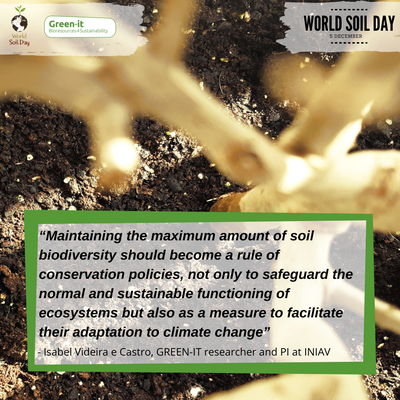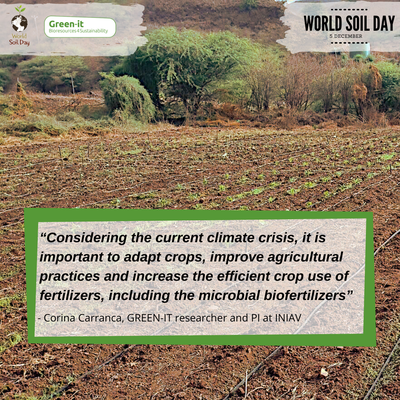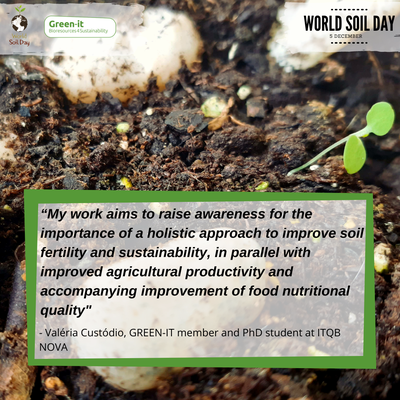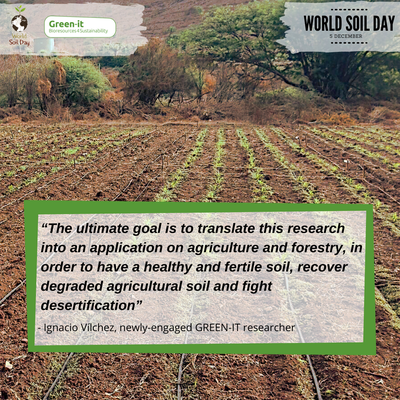World Soil Day 2020
Right under our feet stands the soil, a crucial component of our ecosystem and home to countless communities of bacteria, archaea, viruses, fungi, protozoa, animals and plants, all in constant interaction. On World Soil Day (5 Dec.) we bring awareness to this living resource and especially to the ties between soil, microbiome and plants, who have been under severe pressure due to the current climate crisis, with critical agricultural consequences. Several GREEN-IT researchers are focused on better understanding these fundamental connections.
Contributing to the improvement of soil quality and plant nutrition for a sustainable agriculture is one of the main missions for soil microbiologist researcher Isabel Videira e Castro. At Instituto Nacional de Investigação Agrária e Veterinária (INIAV), Principal Investigator Isabel and her team look to develop strategies to enhance legume pastures in agro-silvo-pastoral ecosystems, and maximize biological nitrogen fixation in degraded soils. A key factor for agricultural sustainability are the symbioses between the plants and the bacteria that reside in the roots, as they contribute to the process of biological nitrogen fixation, a process of utmost importance for low fertility soils. Isabel also explores the use of these bacteria as biofertilizers, by characterizing and selecting endemic strains to later establish cover/pastures with legumes using pre-selected specific bacteria.
the improvement of soil quality and plant nutrition for a sustainable agriculture is one of the main missions for soil microbiologist researcher Isabel Videira e Castro. At Instituto Nacional de Investigação Agrária e Veterinária (INIAV), Principal Investigator Isabel and her team look to develop strategies to enhance legume pastures in agro-silvo-pastoral ecosystems, and maximize biological nitrogen fixation in degraded soils. A key factor for agricultural sustainability are the symbioses between the plants and the bacteria that reside in the roots, as they contribute to the process of biological nitrogen fixation, a process of utmost importance for low fertility soils. Isabel also explores the use of these bacteria as biofertilizers, by characterizing and selecting endemic strains to later establish cover/pastures with legumes using pre-selected specific bacteria.
“This research considers the ecology of soil microorganisms, their interactions with plants, their participation in the functionality of ecosystems, and their dynamics and productivity, which are of great importance for soil sustainability” explains Isabel. “Maintaining the maximum amount of soil biodiversity should become a rule of conservation policies, not only to safeguard the normal and sustainable functioning of ecosystems but also as a measure to facilitate their adaptation to climate change”.

Corina Carranca, Principal Investigator at INIAV, is a soil scientist and plant nutrition researcher with over 40 years of experience in ecosystem functioning. Corina has mainly focused her research on optimizing the efficiency of the use of fertilizer nutrients, looking to decrease nutrient loss from the ecosystem, and also of the use of microbial biofertilizers, such as the symbiotic nitrogen-fixing bacteria and the mycorrhizal fungi, which colonize the roots of some plants. The use of these types of biofertilizers helps to promote plant health and soil stability, while also helping to decrease the use of mineral fertilizers, that come from fossil energy or from nonrenewable natural resources, causing a high emission of pollutants into the atmosphere, soil and water.
Sustainable agricultural practices have also been another focal point of Corina’s research. By exploring soil conservation practices, be it by soil cover in pastures, orchards and vineyards, or by using legumes in crop rotation, Corina hopes to maintain and improve soil quality. “Considering the current climate crisis, it is important to adapt crops, improve agricultural practices and increase the efficient crop use of fertilizers, including the microbial biofertilizers” comments Corina Carranca.

The ITQB NOVA PhD student Valéria Custódio, currently researcher at the University of Nottingham, is using a holistic approach to uncover the relation between soil mineral content, soil microbiome composition and plant microbiota and nutrition, trying to understand the impact of all these factors on plant performance and response to abiotic stressors, mainly water scarcity and nutrient deficiency.
“My work aims to raise awareness for the importance of a holistic approach to improve soil fertility and sustainability, in parallel with improved agricultural productivity and accompanying improvement of food nutritional quality” explains Valéria. “This type of research opens an avenue to study how we can use this knowledge to develop different tools to improve plant’s resilience and nutrient uptake in agro-ecosystems.”

The latest addition to GREEN-IT Research unit is researcher Ignacio Vílchez, an environmental scientist who has focused on studying the interactions between soil, microbiome and plants, especially in situations of stress such as drought. By understanding how plants react to stress conditions and uncovering the communication between them and the bacteria that constitute the soil microbiome and how it affects the nutrition, physiology and development of plants, Ignacio hopes to be able to recruit those bacteria upon a stress event and use them as biofertilizers, maintaining a healthy agricultural soil and stimulating plant growth, while ensuring environmental sustainability.
“After the ocean, soil has the biggest storage of CO2, but the soil is obviously dependent on its health” says Ignacio. “If we can understand the role of these bacteria and their interactions in this ecosystem, we can use these natural potential resources in a way that increases the fertility and stability of the soils, through these biofertilizers. The ultimate goal is to translate this research into an application on agriculture and forestry, in order to have a healthy and fertile soil, recover degraded agricultural soil and fight desertification".
World Soil Day 2020 and its campaign “Keep soil alive, Protect soil biodiversity” aims to raise awareness to the importance of this vital resource, and the necessity to preserve it in order to guarantee humanity’s survival and the health of the planet.


